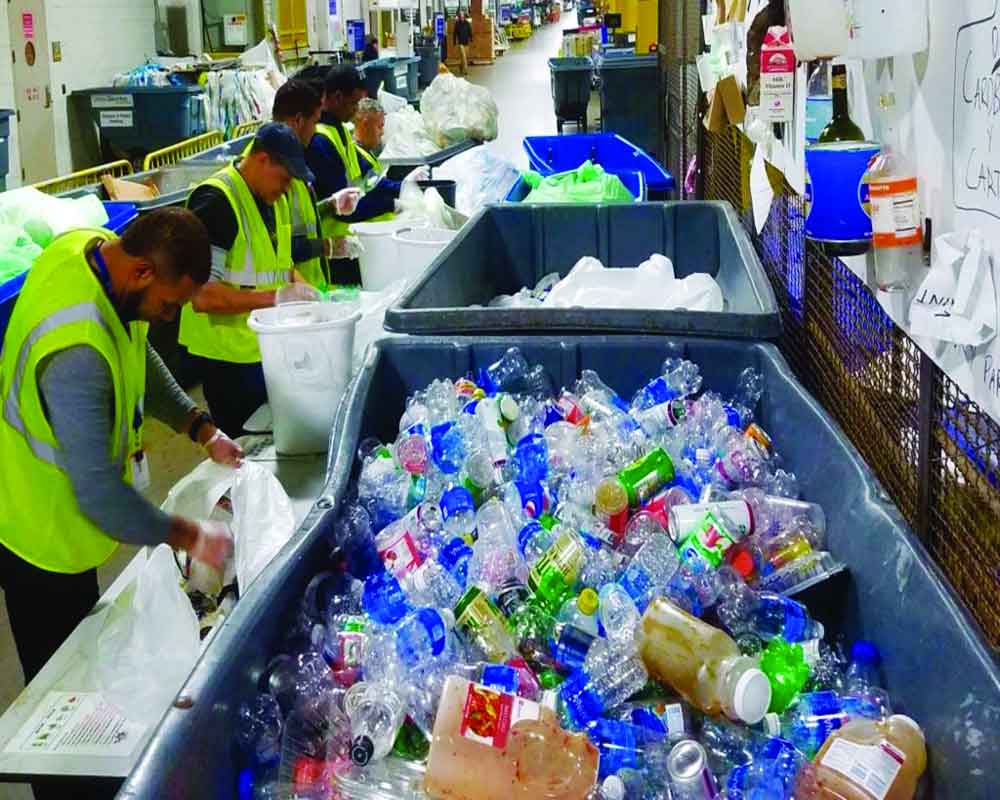AI is reshaping waste management practices, driving the transition towards a circular economy and propelling us towards a more sustainable future
Sustainable Development Goals (SDGs) have garnered increasing attention in recent years. Today, the pivotal role of technology, particularly artificial intelligence (AI), in achieving these goals is gaining prominence, sparking deeper discussions. As the world strides towards sustainable development, smart cities are embracing cyberinfrastructure to foster holistic economic growth, enhance the quality of life, and optimise resource management. However, the mounting challenge of waste management looms large over many urban areas due to the inefficiencies of traditional methods. Yet, smart cities are proactively harnessing innovative technologies like the Internet of Things (IoT), big data, and AI to revolutionise waste management, paving the way for a circular economy (CE). This transition demands a paradigm shift towards a more sustainable supply chain ecosystem.
Innovative applications of AI, from converting waste into valuable resources to reshaping societal perceptions of resource utilisation, are unravelling the complexities surrounding environmental issues. They underscore the potential of collaborative innovation and the boundless opportunities that arise from a unified global community. However, embarking on this transformative journey requires caution, for once initiated, there is no turning back. The revelations unearthed along this path could fundamentally alter our worldview.
At the core of every challenge lies an opportunity for innovation—a chance to redefine the boundaries of what’s achievable and ignite human creativity. Serving as a compass through uncharted territories where waste management, AI and the UN’s 17 Sustainable Development Goals converge, “Sustainable Solutions” charts a course towards a new planetary future. Central to this journey is the evolution of waste management, emphasising the imperative to minimise landfill-bound waste through the principles of a circular economy - reduce, reuse, and recycle. This necessitates innovative approaches from environmental service providers in recycling waste materials.
Predictive analytics, fueled by data and machine learning, holds immense potential in optimising waste management processes, reducing costs, and enhancing efficiency. As projected by the UN, the influx of people into smart cities by 2050 necessitates a radical shift in urban management strategies. With current approaches inadequate to address such growth amidst the backdrop of climate crises and strained urban infrastructure, the rise of smart cities becomes imperative. Efficient waste management emerges as a cornerstone of this transformation.
Innovation and investment serve as catalysts for economic prosperity worldwide, but realising their full potential requires conducive public policies. Establishing a supportive regulatory framework, simplifying bureaucratic processes, and safeguarding intellectual property rights are pivotal in fostering innovation-friendly environments. Additionally, investing in STEAM education, research infrastructure, and promoting collaboration between academia and industry accelerates innovation ecosystems.
Financial incentives such as tax credits and subsidies play a crucial role in driving innovation and investment in waste management AI tools. Public-private partnerships offer avenues for co-financing R&D projects, incubating startups, and deploying venture capital. Moreover, nurturing entrepreneurship through mentorship programmes and providing access to seed capital fosters a vibrant startup culture essential for sustainable economic growth. Infrastructure development, especially in transport and communication networks, is essential for facilitating innovation clusters and attracting investments.
Collaboration and clustering emerge as linchpins in fostering innovation and competitiveness. National policies that encourage the formation of innovation clusters drive knowledge sharing, resource pooling, and collaborative research, thereby creating specialised centres of excellence. However, integrating AI and robotics into waste management poses formidable challenges, including data diversity, accurate waste classification, and effective recycling methods.
Transitioning towards a circular economy necessitates radical shifts in waste management practices to combat the escalating environmental threats posed by mounting waste. While smart enabling technologies offer promising solutions, numerous obstacles hinder their widespread adoption. Waste management software integrated with AI and computer vision streamlines sorting processes, significantly improving waste separation accuracy. Geographical indications (GIs), often overlooked in favour of major inventions (MIs), play a pivotal role in promoting sustainable development. Examples include community energy production, organic food, and local waste management initiatives, which contribute significantly to sustainability.
Addressing the surging global waste generation requires comprehensive strategies leveraging AI and sustainable practices. As AI continues to evolve, ensuring its sustainability and environmental friendliness is paramount. While sustainable AI solutions hold promise in mitigating environmental challenges, careful consideration of potential unintended consequences is imperative.
In conclusion, the intersection of AI, waste management, and sustainable development offers a pathway towards a more resilient and prosperous future. Embracing innovation, fostering collaboration, and implementing conducive public policies are essential to realising this vision. By harnessing the transformative power of technology and sustainability, we can pave the way for a more equitable, prosperous, and environmentally sustainable world.
(The writer is an Associate Professor at the School of Management, Presidency University Bengaluru; views are personal)


























